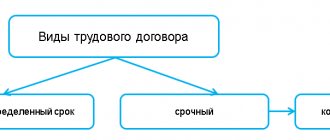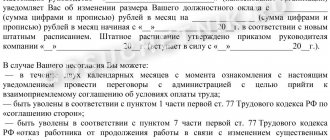In the practice of working with hired personnel, situations sometimes arise when the work of employees is needed not on an ongoing basis, but for some time. In this case, it is worth concluding a fixed-term employment contract with such employees. Unlike ordinary (unlimited) contractual relationships, such contractual relations cannot last longer than the time specified by law.
Fixed-term contracts have their own nuances of conclusion, which should be observed by both parties in order to avoid misunderstandings, which will then have to be resolved in court. Let us analyze the grounds for formalizing such labor relations, their legal basis, as well as the main points that employees and employers need to take into account.
Legislative justification for fixed-term contracts
The word “urgent” in the definition of this type of contract does not mean any additional speed of its execution; it comes not from “urgency”, but from “deadline”. This is how it is declared to differ from contracts that are concluded for an indefinite period.
In the usual form of employment contractual relations, the start date of work is precisely known, but the time of separation and the reasons for dismissal cannot yet be determined. But when the last condition is known to both parties, that is, both the employee and the employer know when they will terminate their cooperation agreement, it is advisable to formalize the relationship with a predetermined period - a fixed-term employment contract .
The Labor Code of the Russian Federation calls an employment contract mandatory when formalizing the “employee-employer” relationship (Article 56 of the Labor Code of the Russian Federation), and the term is its essential condition. Options when an employer gives an employee temporary employment are defined in Art. 59 Labor Code of the Russian Federation. Their determining factor is an important circumstance: a fixed-term employment contract is legal only when, for objective reasons, it is impossible to conclude a permanent one.
NOTE! To conclude such an agreement, the will of the employer and even the consent of the employee are not enough; its execution must comply with the grounds given in the legislation. Otherwise, if you have to deal with it in court, a fixed-term contract concluded on an illegitimate basis will be recognized as unlimited.
Features of calculations
Sick leave
- If the contract period is less than 6 months, sick leave is paid for no more than 75 calendar days (Part 4, Article 6 of Law No. 255-FZ). Exception: for tuberculosis, benefits are paid for all days of illness.
- If the contract period is 6 months or more, sick leave is paid as usual.
Vacations and compensation upon dismissal
1. If the contract is concluded for a period of less than 2 months or for the duration of seasonal work, leave is provided in working days:
- Duration of vacation: 2 working days for each month of work (Articles 291, 295 of the Labor Code of the Russian Federation).
- Vacation pay: the number of working days of vacation multiplied by the average daily earnings (according to the calendar of a six-day working week) (Article 139 of the Labor Code of the Russian Federation, clause 11 of the Decree of the Government of the Russian Federation of December 24, 2007 No. 922).
2. If less than a month has been worked, the actual work time is included in the billing period (clause 7 of the Decree of the Government of the Russian Federation of December 24, 2007 No. 922).
Calculation example:
The employee was hired under TD for the period from 06/01/2021 to 06/21/2021. Earnings for this period are 30,000 rubles. Compensation for unused vacation will be: 2 days. x 30,000 rub. / 17 work. days = 3,529.41 rub.
The attractiveness of fixed-term employment contracts
The party that benefits most from entering into a fixed-term rather than an open-ended contract is the employer. The reasons are obvious:
- an employee on a temporary basis is more manageable;
- It is easier to motivate a “conscript”, since the extension of cooperation with him directly depends on the management;
- it is much easier to carry out the dismissal procedure;
- an employee dismissed at the end of his term cannot challenge such dismissal;
- In this way, you can get rid of any categories of employees, even the most socially protected ones.
For workers, as a rule, permanent employment is preferable, providing certain guarantees and confidence in their future. Domestic legislation and the International Labor Convention (ILO) adhere to the same position, seeking to minimize the number of workers employed on a temporary basis.
Features of a fixed-term employment contract
The determining factor in the choice in favor of the urgency of contractual relations is an important circumstance: a fixed-term employment contract is legal only when, for objective reasons, it is impossible to conclude a permanent one.
This reason must be indicated in the text of the contract.
The validity period of such an agreement cannot exceed 5 years. If the document does not indicate specific terms or an event that terminates the contractual relationship, it will automatically be considered a contract with an indefinite period. Likewise, if a period of more than five years is specified.
Termination of a fixed-term contract must be indicated in the text. This is possible in two ways:
- indicating a specific date when the contract will be terminated;
- designation of an event, the occurrence of which terminates the validity of the fixed-term contract.
The arrival of the final date does not mean immediate termination of work: the employee must be notified in writing 3 days in advance of the upcoming dismissal in accordance with its expiration. If this is not done, the dismissal can be challenged.
In the second case, prior notification is impossible, since the occurrence of an event automatically terminates the fixed-term contract, as provided for by its terms. Most often, such an event is the return to work of the main employee, instead of whom a temporary one was hired.
Does the employee have to work for the entire term of the contract?
Specifying a validity period in an employment contract does not oblige the employee to work it out in full. After all, all other grounds for termination of employment relations provided for in the Labor Code of the Russian Federation remain in force.
This may be an agreement of the parties (Article 78), an initiative of the employee (Article 80), or an initiative of the employer (Article 81). The presence of a validity period in an employment contract simply allows the employer to dismiss an employee for one more reason - due to the expiration of the term (clause 2 of Article 77 of the Labor Code of the Russian Federation).
In the event that neither party declares termination of the employment relationship upon expiration of the term, and the employee continues to work, the contract from a fixed-term one becomes indefinite.
Does this need to be formalized somehow? On the one hand, there is Article 58 of the Labor Code of the Russian Federation, on the basis of which a fixed-term employment contract is automatically reclassified as concluded for an indefinite period. But on the other hand, there is a letter from Rostrud (dated November 20, 2006 No. 1904-6-1), which says that in this case it is necessary to draw up an additional agreement to the fixed-term contract.
Is it possible to re-conclude a fixed-term contract on the same terms and with the same employee? The Labor Code of the Russian Federation does not prohibit this, but if the contract is re-signed multiple times, the court may come to the conclusion that these employment relationships are indefinite. In this case, the employer may be fined for violating labor laws.
However, courts do not always come to this conclusion. An example is the Appeal Ruling of the Saratov Regional Court dated October 17, 2019 No. 33-8580/2019. An employee with whom fixed-term contracts were renewed 7 times in a row demanded that the employment relationship with him be recognized as permanent. Moreover, the first court decision was in his favor, but the appellate instance did not support the plaintiff. The court came to the conclusion that since the parties entered into a fixed-term employment contract from year to year, this happened with the consent of the employee, and there was no violation of the law here.
With whom can you enter into fixed-term employment contracts?
Employers formalize such relationships with those employees whose nature of work does not make it possible to determine the duration of the working relationship or, on the contrary, quite clearly indicates their end. Such categories of personnel include, for example, the following:
- seasonal workers;
- employees hired to complete a specific type of work by a specific date;
- employees who were sent to work abroad or to another branch of the organization;
- specialists hired from outside to perform work not provided for by the organization’s core activities;
- teachers who can work in the corresponding position only for the duration of the competition;
- replacing an employee on long-term sick leave or maternity leave, etc.
Transfer to a fixed-term employment contract from an open-ended one
As a rule, employees work under an open-ended contract. However, sometimes there is a need to transfer to a fixed-term contract. This can be done, but the procedure must comply with all the rules.
Reasons for transferring to a fixed-term employment contract
An employee can only be transferred to a fixed-term contract if there are sufficient grounds for doing so. If there are no such grounds, the agreement will be considered unlimited. An employer must not enter into fixed-term agreements for the purpose of deviating from providing employees with rights and guarantees. Let's look at the reasons why an employer makes a transfer:
- The employee is appointed to replace the temporarily absent employee. The latter retains his place of work.
- An employee is sent to temporary work abroad.
- The work involves a temporary expansion of production.
- The employee has a disability.
That is, transfer to a fixed-term contract is relevant in cases where the employee’s status changes. For example, he developed health restrictions.
Is it legal to transfer to a fixed-term contract?
The issue of the legality of transferring an employee to a fixed-term agreement is extremely controversial. If the employer initially signed the employee up to an open-ended contract, he must ensure compliance with the terms of this agreement. That is, the worker receives the right to work for an unlimited time.
The contract can be terminated only on the basis of the clauses established by the Labor Code of the Russian Federation.
For this reason, transferring an employee from an open-ended to a fixed-term contract is not legal. The employer cannot, for the purpose of transfer, simply enter into an additional agreement. The employee, if desired, can easily challenge this document.
Another significant mistake is drawing up a new agreement while the previous agreement is still in effect. According to the law, if two documents apply to an employee, the document with the most favorable conditions will be valid. In this case, the most advantageous would be an open-ended contract, since it provides a larger list of rights.
IMPORTANT! Many employers believe that entering into a new agreement automatically cancels the previous agreement. However, this is a wrong position. In order for only one act to be in effect, the old act must be legally repealed.
How to legally transfer a person to a fixed-term contract?
The only legal way to transfer an employee to a fixed-term contract is to terminate the previous agreement and draw up a new one. However, you need to take into account all the disadvantages of this path:
- The need to pay compensation for vacation that was not used.
- The accrual of length of service for vacation registration begins anew. In order for an employee to be able to legally go on vacation, he needs to work for 6 months. For example, an employee under the first open-ended contract worked for 5 months. That is, after a month he can go on vacation. However, if the previous agreement is terminated, another agreement is drawn up, the vacation will be legal only after 6 months.
- You will have to draw up cadastral documentation for the employee as a newly hired employee.
The legislation does not provide for a simplified procedure for dismissing an employee and rehiring him. The listed difficulties are related to preventing abuse.
Procedure for drawing up a new employment contract
Let's consider the legal procedure for transferring an employee to a fixed-term contract by drawing up a new agreement:
- The employer conducts a conversation with the employee and offers him new working conditions. Explains the translation scheme.
- The employee resigns at his own request or by agreement of the parties.
- A new employment contract with a limited duration is immediately drawn up. The manager issues an order to hire a person.
- The relevant information is entered into the work book.
This method of transfer is more complicated, but it is legal.
conclusions
Labor legislation does not require writing an application for a new job. An employee needs to write this document only if the organization has a practice of preparing and submitting this form for the purposes of convenient document flow.
Such a requirement may be specified in the company’s local regulations.
In the text, the job seeker writes not only a request to be accepted into the organization, but also indicates that the relationship will be temporary.
Legitimate reasons for urgency
The law provides for two legitimate reasons for concluding a fixed-term rather than an open-ended employment contract:
- Relationships are concluded strictly for a certain period, based on the nature of the work to be done and the accompanying circumstances.
- The urgency of labor relations is determined by the agreement of the parties in cases where this does not contradict current legislation.
The labor legislation of the Russian Federation (Part 1 of Article 59 of the Labor Code of the Russian Federation) allows the conclusion of fixed-term contracts arising from the nature of the work in the following circumstances:
- for a time when a full-time employee is absent from his workplace for objective reasons, whose workplace must be retained by law;
- the upcoming work will not take more than 2 months;
- to provide seasonal labor;
- for foreign forms of work;
- performing actions necessary for the company, but not related to its main activities (for example, installation work, repairs, reconstruction, etc.);
- work associated with a limited (usually up to a year) time period, such as expanding activities, increasing capacity, volumes, etc.;
- the company is specifically created for a short existence, providing a limited time for performing specific work;
- labor related to vocational training and internship of employees;
- election to a working elective body for a certain period;
- assignment to community service;
- additional cases provided for by Federal legislation (existing and possible to be adopted in the future).
A fixed-term employment contract, by agreement of the parties, can be concluded only on a limited list of grounds:
- the employer is a small business representative;
- employee - pensioner;
- a medical employee is allowed only temporary employment;
- work in the Far North and other equivalent territories;
- when elected through a competition to fill a vacant position;
- urgent work aimed at preventing and/or eliminating the consequences of emergency situations;
- with management, deputies and chief accountants of organizations;
- with creative workers (in accordance with the list of similar positions);
- with pupils or full-time students;
- with part-time workers;
- with those working on watercraft registered in the Russian International Register of Ships;
- other grounds consistent with federal laws (current and future).
Employer, remember:
- You cannot conclude a fixed-term employment contract on grounds not specified in Art. 59 Labor Code of the Russian Federation;
- when dismissing an employee after the expiration of a fixed-term contract, do not forget to notify him in writing 3 days in advance;
- did not warn about dismissal - the contract will become indefinite.
Decor
When hiring under a fixed-term employment contract, in the employment order in form No. T-1
or
T-1a
, you need to indicate the expiration date of its validity or the event that will serve as the basis for its termination, for example, the employee’s departure from parental leave.
Attention
Payments under a fixed-term employment contract are subject to both personal income tax and contributions to funds in the general manner.
In addition, in the section “Conditions of employment, nature of work” it should be indicated that the employee is hired for a certain period and (or) to perform specific work. For example, “under a fixed-term employment contract in connection with being sent to work in Amsterdam” (see an example sample of filling out an order for employment under a fixed-term employment contract).







